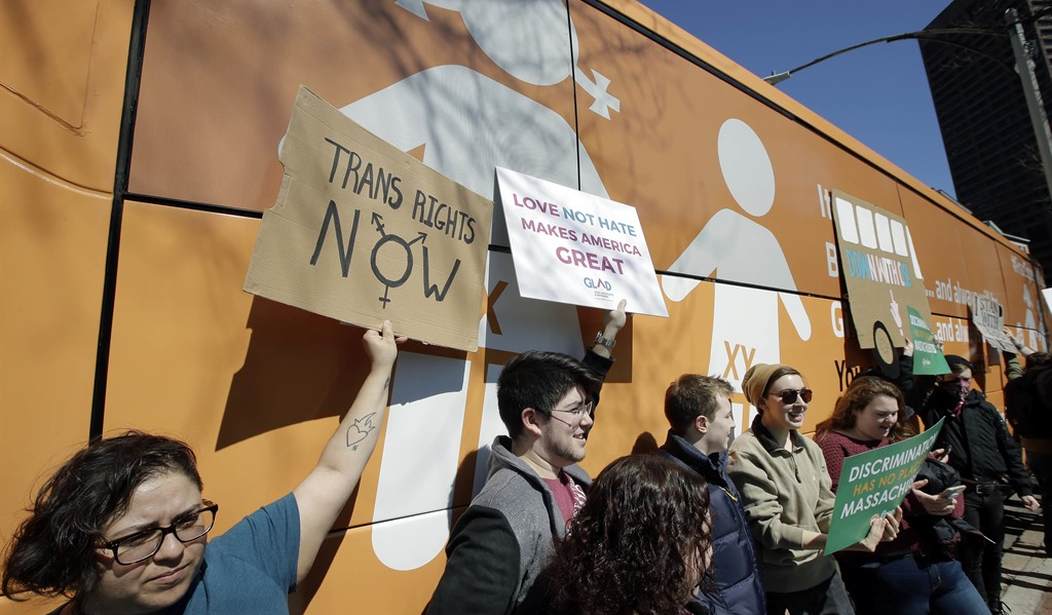YouGov has some new polling out which will no doubt serve as fuel for the national fire in the debate over transgender rights. The top line in the survey is the one they likely assume will provoke the most debate (though there are some more telling numbers underneath). It’s the finding that more than 20% of survey respondents believe that transgenderism, gender dysphoria, gender impersonation or whatever you choose to call it these days, is a form of mental illness. After leading with a salute to RuPaul’s Drag Race as a positive sign of societal growth (I’m not even kidding about that one) they launch into the survey results.
Despite attempts made by select celebrities and the media to promote understanding of marginalized individuals, a recent YouGov survey found that 21% of Americans think that identifying as transgender is a form of mental illness, and 39% believe that being transgender is a choice.

Allow me to confess right up front that I’m a bit surprised it’s actually that low. And I don’t say that because I’m looking to throw stones here, but rather because the entire subject of mental illness is so complicated and public opinions can shift wildly in these types of conversations. Frankly, even I’m a bit uncomfortable with using the term “mental illness” to describe it given the stigma attached to the phrase. (Particularly since I have both friends and one close relative in the category.) The human brain is complex beyond our imagining and we’re still throwing darts at the board in many ways when we deal with questions such as this. But with all that in mind, how “wrong” is that description?
Think about it for a moment. If you found a person who was absolutely and utterly convinced that they were a werewolf, absent any and all scientific proof that they were anything other than a standard issue human being, would you describe them as having a mental illness? The medical community does and it’s a condition known as clinical lycanthropy. Similarly, if you encountered someone who insisted that they were actually dead but still walking around like a zombie for some reason, despite every available medical test showing that they were clearly alive, you might think that something had gone seriously wrong in their mental wiring as well. Doctors would agree with you and they refer to that condition as Cotard’s Syndrome or Cotard’s Delusion. Why then, if you meet someone who would pass any possible scientific test of their physical anatomy and genetic code showing them to be one of the two established genders of human beings, would you blandly accept that they are the opposite based on their belief? (We’re not talking about intersex folks here, which falls into another category entirely.)
With all that in mind, I repeat my amazement that the number in the first survey question came in as low as 21%. As to people who think it’s “a choice” I have little to offer. That requires mind reading, a skill which is not my forte.
But understanding the points made above, it’s perhaps somewhat easier to accept some of the other numbers in the survey which activists will no doubt find even more offensive and use as “proof” that we’re an intolerant society. Let’s just list the major ones here:
- 27% are not open to being friends with anyone who identifies as a transgender man or woman.
- Only 17%, 16% and 18% respectively would consider dating, either casually or seriously, a transgender man, woman or non-binary individual.
- Just 15% would be open to the idea of engaging in a sexual act of any kind with a transgender man (born a woman) or non-binary person.
- Only 13% would consider physical (sexual) intimacy with a transgender woman (born a man).
Does this really come as a surprise to anyone? The first statistic puts me off a bit because I don’t really believe in rejecting a potential friendship with someone just because they are “different” in some way. But it’s basically obvious to most of us that any person born with male genitals and a Y chromosome is not a woman. Even if they say (and indeed truly believe) they are, that “belief” does not mean that your average heterosexual male is going suddenly be open to the idea of dating, marrying or engaging in intercourse with them. And expecting anyone to do so at the risk of being branded “transphobic” (or whatever the curse du jour is) is not only unfair, but completely unreasonable. And it’s not going to win you any converts.
I’ll leave the question of whether or not gender dysphoria is clinically a mental illness to the medical community. There are some groups of doctors who say it is while others say it’s not. But there is no repeatable science to back up the underlying claim of someone being the opposite gender from the coding in their DNA, so declaring those of us who don’t accept the latest social just warrior term paper as some definitive redefinition of realty to be in the wrong isn’t going to carry any weight.







Join the conversation as a VIP Member